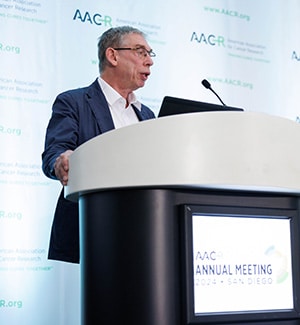In 1796, Edward Jenner inoculated a young boy with cowpox to protect him from smallpox, an early example of vaccination.
Fast forward 200+ years: smallpox has been eradicated, and the cowpox virus (now known as vaccinia virus) is being used to develop an entirely different type of vaccine—one that treats cancer.
Unlike preventive vaccines, such as those that protect against COVID-19 and the flu, therapeutic cancer vaccines are designed to treat existing cancers by training the patient’s immune system to recognize and destroy cancer cells.
At the American Association for Cancer Research (AACR) Annual Meeting 2024, researchers reported that a newly developed therapeutic cancer vaccine was effective in patients with head and neck squamous cell carcinoma (HNSCC).
The new vaccine, TG4050, uses an engineered form of the vaccinia virus to deliver 30 personalized neoantigens (proteins unique to each patient’s tumor) into the patient to induce activation of an antitumor immune response.
The researchers hypothesized that TG4050 could help reduce the high risk of disease recurrence in patients whose HNSCC has been surgically removed.
“A therapeutic vaccine tailored to each patient’s unique tumor may lead to strong immune responses, which could eliminate any minimal residual disease that may eventually lead to disease relapse,” explained presenter Olivier Lantz, MD, PhD, a clinical immunologist and researcher at Institut Curie in Paris.
During his presentation, Lantz shared data from an ongoing phase I clinical trial evaluating the safety and efficacy of TG4050. The trial includes 33 patients with stage 3 or 4 HPV-negative HNSCC who underwent surgery and other standard-of-care treatments. Patients were randomly assigned to one of two arms: the 17 patients in Arm A received TG4050 immediately after standard-of-care treatment, while the 16 patients in Arm B were assigned to receive TG4050 only upon disease relapse.
Lantz reported that none of the evaluable patients in Arm A experienced disease relapse after a median follow-up of 16.2 months. Three patients in Arm B experienced disease relapse—one after 6.2 months, another after 8.8 months, and a third after 18.5 months.
Adverse events associated with TG4050 were mild to moderate, and the most common TG4050-related adverse event was a reaction at the injection site.
“Our findings indicate that TG4050 is safe and promotes an immune response against several neoantigens in most patients,” Lantz said.
He noted that most patients whose immune cells were evaluated after vaccination showed signs of activated neoantigen-specific T cells, the majority of which were not present prior to receiving TG4050. Further, the neoantigen-specific T cells had an effector memory phenotype, suggesting they may have antitumor activity.
“We are really excited by these preliminary data, as well as by the body of evidence that is being built by the community in favor of neoantigen-based vaccines,” Lantz said. “Studies like ours are demonstrating the potential of individualized neoantigen-based therapeutic vaccines to be a part of tomorrow’s standard of care.”
Three Years Later, A Pancreatic Cancer Vaccine Stays on Message
Messenger RNA (mRNA) became a household term during the pandemic, but long before the first COVID-19 vaccines were approved, mRNA vaccines were being explored for cancer treatment.
The idea: inject a patient with mRNA that encodes a protein unique to that patient’s tumor. Since these personalized neoantigens are not found in normal cells, the immune system recognizes them as foreign and mounts a response against any cell that expresses them. This allows the therapy to target cancer cells, while minimizing the effect on healthy cells.
The downside of personalized neoantigen cancer vaccines, however, is that they must be custom-made for each patient, a process that can slow down treatment, explained presenter Vinod Balachandran, MD, a surgical oncologist and member of the David M. Rubenstein Center for Pancreatic Cancer Research at Memorial Sloan Kettering Cancer Center.
To circumvent this issue, Balachandran and colleagues explored the use of an mRNA platform, which allows the vaccines to be manufactured relatively quickly. They developed an mRNA-based personalized cancer vaccine, autogene cevumeran, to target up to 20 unique neoantigens identified from each patient’s tumor and evaluated its potential against pancreatic cancer, a disease with a high risk of relapse and death.
In his presentation, Balachandran reported three-year follow-up data from a phase I clinical trial that evaluated the postsurgical use of autogene cevumeran combined with immune checkpoint inhibition and chemotherapy for patients with resectable pancreatic cancer.
This presentation built upon results reported at last year’s AACR Annual Meeting, which showed that patients who had vaccine-induced immune responses were less likely to experience disease recurrence during the first 18 months of follow-up compared with those who did not experience a response to the vaccine.
This year, Balachandran reported that, after a median follow-up of three years, responding patients continued to have significantly longer median recurrence-free survival (not reached) compared with those who did not experience a vaccine-induced immune response (13.4 months).
He also showed that the treatment led to the expansion of multiple CD8+ T cell clones, which, for most responding patients, persisted in the blood long term and remained responsive in ex vivo rechallenge experiments.
“Our data indicate that autogene cevumeran can induce CD8+ T cells with significant longevity, substantial magnitude, and durable function,” summarized Balachandran. “The findings that individualized neoantigen-specific cancer vaccines can induce a robust immune response that correlates with delayed disease recurrence continues to support these vaccines as an encouraging therapeutic approach for pancreatic cancer.”
New Horizons in the Search for Neoantigens
A key step in developing personalized vaccines is finding the right neoantigens, a task that has been facilitated by recent advances in technologies. In a major symposium on Antigen Discovery and Validation for Cancer Vaccines, researchers shared some of the new approaches they are applying to identify neoantigens and evaluate their immunogenicity.
These approaches included algorithms that combine next-generation sequencing, peptidomics, and various endogenous factors to predict neoantigen immunogenicity; assays to characterize how T cells respond to neoantigens; and the generation of large libraries of T-cell receptors that respond to diverse antigens.
As this field continues to grow, what advances can we expect next? Read our interview with prominent cancer vaccine researcher Catherine J. Wu, MD, FAACR, to learn more about cancer vaccines and anticipated progress.
The post Personalized Neoantigen Vaccines Boost Progress Against Aggressive Cancers appeared first on American Association for Cancer Research (AACR).

